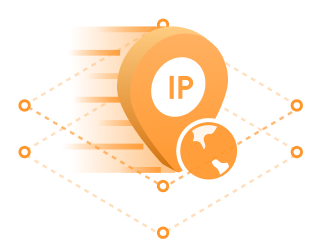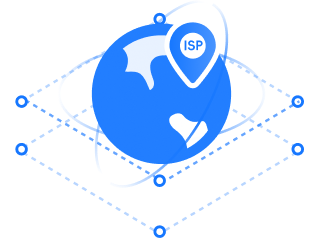Nowadays, with the rapid development of Internet technology, IP addresses have become increasingly important as the "identity card" for network communication. Among the various types of IPs, dynamic IPs have become indispensable assistants in multiple fields due to their flexibility and diversity. So, what exactly are dynamic IPs? And in which scenarios are they mainly used? We will delve into the applications of dynamic IPs, exploring their uses in everyday life and corporate needs, which are far broader than you might imagine!
I. What Are Dynamic IPs?
Before discussing specific applications, we need to clarify: What are dynamic IPs?
Dynamic IPs refer to IP addresses assigned for short periods. Unlike static IPs (long-term fixed IPs), devices may be assigned a new IP address each time they reconnect to the network. As long as the dynamic IP allocation rules are reasonable, it can ensure the normal operation of the network connection while allowing flexible switching of IP addresses when needed.
Benefits of using dynamic IPs:
l Dynamic IP allocation is flexible and can improve the utilization of network resources.
l Changing IPs can reduce restrictions caused by frequent use of the same IP.
l For businesses requiring numerous requests, proxy IPs are suitable for projects with multi-concurrent operations.
Due to their flexibility, dynamic IPs are widely used in various scenarios for both ordinary users and enterprises.
II. What Are the Practical Application Scenarios of Dynamic IPs?
Dynamic IPs have a wide range of uses, covering everything from personal data security protection to corporate efficiency enhancement.
1. Guardian of Network Data Protection
When users access the network using a dynamic IP, the IP for network requests will change periodically. For individuals or businesses with data security protection needs, this means users' online behavior is not easily tracked or correlated, effectively enhancing network data security.
Personal Daily Use Scenarios:
When individuals use dynamic IPs in public places such as cafes and airports, it can prevent hackers from snooping in the same network environment. Or when using it, it prevents restrictions or special attention due to frequent visits to specific platforms. The switching of dynamic IPs makes it more difficult for websites to track users' browsing habits. In addition, with the help of dynamic IPs, businesses can protect their business intentions from surveillance, making their actions more concealed.
2. Powerful Tool for Web Crawling and Data Collection
In the big data industry, crawling public network data is a crucial operation. However, target websites often implement restrictions on the same IP with too frequent or high-concurrent access to prevent malicious scraping. High-frequency crawling is easily affected by these restrictions.
Dynamic IPs can effectively solve the following problems:
l Pressure Distribution: By constantly rotating IPs, dynamic IPs make each network request appear to come from different users, avoiding targeted restrictions.
l Evading Anti-crawling Systems: Switching IPs can effectively avoid triggering the target website's anti-crawling mechanisms.
l Improving Task Success Rates: Dynamic IPs make crawlers more "random," thereby improving the effective completion rate of data collection tasks.
3. Accelerator for High-concurrent Tasks
Dynamic IPs are very useful when handling large-scale high-concurrent tasks. Suppose you need to make a large number of network requests on different platforms simultaneously; a single IP will soon be restricted. Dynamic IPs can accelerate batch tasks by switching to newly assigned IPs multiple times, completing more complex operations through distributed requests. They also avoid being blocked by target websites due to excessive traffic and enhance the system's traffic carrying capacity.
For example, data reading on blockchain, data synchronization for multi-account systems, and data capture required for AI training all rely on the protection provided by dynamic IPs.
4. Bridge for Building Regionalized Businesses
Dynamic IPs not only switch IPs but can also lock in IP addresses from specific regions as needed. This feature makes them an important tool for cross-border e-commerce and global businesses. For example, sellers who need to view regional information such as product prices and demand popularity in overseas markets may not be able to obtain correct regional information without IPs from the corresponding countries. Dynamic IPs can meet this need, helping merchants remotely conduct localized competitive analysis.
Moreover, when advertising in different countries, companies can use dynamic IPs to simulate target market behavior, conducting tests such as ad frequency, click-through rates, and actual loading effects, obtaining more accurate results with localized IPs.
5. Helping Achieve Traffic Load Balancing
Some large enterprises may need to maintain high-speed data exchange round-the-clock. In this case, dynamic IPs can simultaneously share the pressure of the main IP and optimize traffic load by allocating multiple addresses, improving operational stability. Dynamic IPs have become the standard technology for enterprises to optimize business traffic.
6. Content Monitoring and Competitive Analysis
Whether it's media companies, research teams, or market research experts, they all need to use dynamic IPs to help expand their businesses. For example, dynamic IPs can be used to track real-time updates on media platforms and collect market dynamics of competitor products without triggering awareness from the target server, enabling corporate competitive analysis. In addition, dynamic proxy IPs provide powerful technical support for content verification and advertising delivery analysis, making these tasks more efficient and accurate.
7. Essential Assistant for Gaming and Entertainment Acceleration
Dynamic IPs also have a wide range of applications in the gaming industry:
Online games have high requirements for network connection speed and stability. High-speed and stable networks are crucial for gamers' experiences. Dynamic IPs can distribute traffic to avoid congestion, effectively maintaining the speed and stability of the network connection.
Some games may have regional restrictions, prohibiting access from IPs from other regions, preventing players from certain areas from playing. Using dynamic IPs can easily bypass these restrictions, allowing access to global server resources.
In addition, for users of entertainment platforms, dynamic IPs can effectively solve the issue of accessing copyrighted content, enabling the viewing of streaming media resources restricted in certain countries.
III. The Significance of Dynamic IP Proxies
Agile and efficient dynamic IPs can enhance the experience of network users in various aspects and have become an indispensable part of the modern Internet ecosystem. They play crucial roles in personal security, globalized businesses, high-intensity concurrent request tasks, and other aspects. Dynamic IPs support users in going further and enjoying more convenient services with their powerful technical capabilities. With the in-depth development of the big data era, we believe that the application scenarios of dynamic IPs will become even more extensive.
Go2Proxy is a reliable provider of dynamic residential proxies, offering a massive pool of self-operated, high-speed proxies with rigorous quality control and advanced anti-detection mechanisms. Whether you need proxies for web scraping, data collection, or any other business scenario, Go2Proxy can seamlessly integrate into your projects and provide you with a smooth, secure, and anonymous web experience.





























